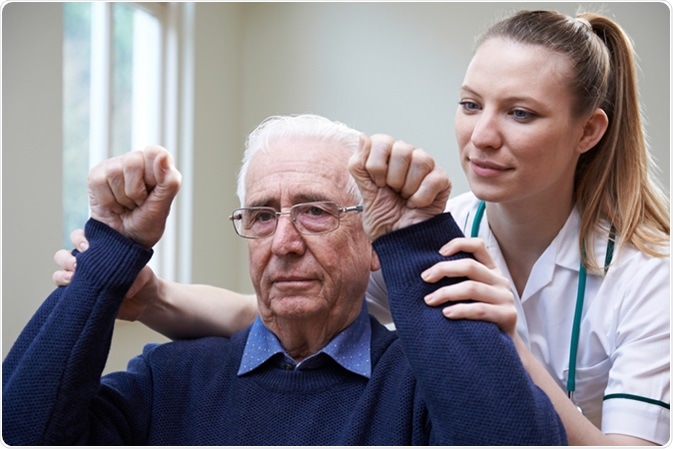Deprivation of brain oxygen and nutrient supply due to reduced or interrupted blood flow leads to stroke. Such condition seeks immediate medical attention; if treated promptly, brain damage and other complications arising from stroke can be prevented.

Nurse Assessing Stroke Victim By Raising Arms. Image Credit: SpeedKingz / Shutterstock
There are two types of stroke: ischemic stroke – which accounts for 80% of all stroke cases, and occurs due to blockage in the arteries which supply blood to the brain; and hemorrhagic stroke – which occurs due to leaking or bursting of a blood vessel. The main signs and symptoms of stroke include speech difficulties, confusion, paralysis or numbness of the face, arm, or leg, vision problem, headache, and troubled locomotion.
Inflammation, which is body’s immune response to harmful agents/injuries, plays a crucial role in the pathogenesis of ischemic stroke. Many cells, such as white blood cells, platelets, endothelial cells, and mast cells get activated during inflammation process, and start releasing proinflammatory mediators such as histamine, prostaglandin, lysosomal compounds, and cytokines to trigger vasodilation and increase blood vessel permeability. As a result, blood supply to the injured or affected area increases, which, in turn, brings more defense cells to the affected site and triggers the healing process.
In case of ischemic stroke or brain injury due to lack of oxygen, both acute and chronic inflammatory processes get activated. Such phenomena are characterized by rapid activation of microglia (resident macrophage cells which act as the first line of defense system in the central nervous system), production of proinflammatory mediators, and infiltration of inflammatory cells such as neutrophils, T cells, macrophages, phagocytes etc. to the site of injury.
Inflammation and Stroke - Leslie Ritter
Stroke-induced Activation of Inflammatory Network
Ischemic brain injury triggers a cascade of time-dependent inflammatory pathways which play important roles in deciding the fate of damaged brain tissues. During the acute phase of ischemic stroke which lasts for minutes to hours, injured brain tissue increases the production and release of cytokines (interleukin-1β, interleukin-6, and tumor necrosis factor-α), chemokines (monocyte chemoattractant protein-1 and macrophage inflammatory protein-1α), and reactive oxygen species (ROS). These mediators increase the expression of adhesion molecules, such as intercellular adhesion molecule-1, selectin, macrophage-1, lymphocyte function-associated antigen-1, and P-selectin glycoprotein ligand-1 on brain microvascular endothelial cells and leukocytes. It subsequently leads to morphological alteration of the blood brain barrier, adhesion, and transendothelial migration of circulating leucocytes including neutrophils, monocytes, and T cells. In the sub-acute phase of stroke which lasts for hours to days, infiltrated leukocytes release more cytokines and chemokines, increase the production of ROS, and activate matrix metallopeptidase-9 (MMP-9); causing significant amplification in the inflammatory milieu of the brain. Such robust inflammatory response eventually leads to the disruption of the blood brain barrier, development of brain edema, neuronal death, and hemorrhagic transformation.
In contrast to severe detrimental effects, some of these inflammatory mediators show protective functions in the late phase of ischemic stroke. For example, MMP-9 has shown to promote brain regeneration and neurovascular remodeling by increasing the expression of neurotrophic and protective factors.
In many animal models of ischemic and hemorrhagic stroke, administration of anti-inflammatory drugs to reduce stroke-induced inflammation has shown to decrease the infract volume and improve clinical outcomes. Moreover, administration of neuroprotactants to suppress inflammation has shown to reduce stroke-related side-effects and increase the therapeutic time frame for tissue plasminogen activator (tPA), a thrombolytic or clot dissolving agent used to treat stroke patients within 3 hours following the onset of symptoms. However, such anti-inflammatory agents have failed to show better outcomes in clinical trials, despite beneficial effects in animal models. To address this discrepancy, researchers are now focusing on combining basic stroke therapies (restoration of cerebral blood flow) with anti-inflammatory treatments to improve clinical outcomes in stroke patients.
Further Reading
Last Updated: Aug 23, 2018